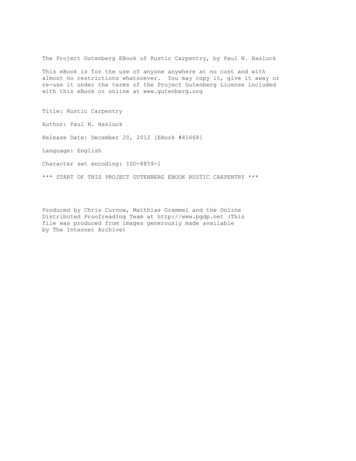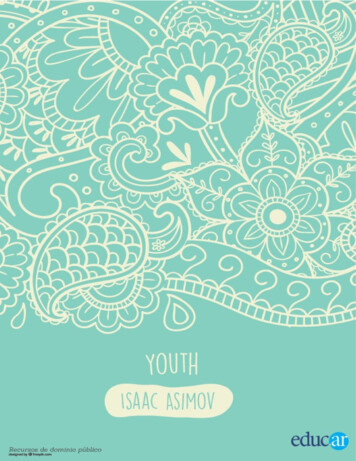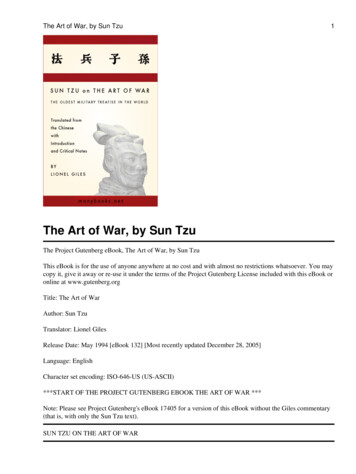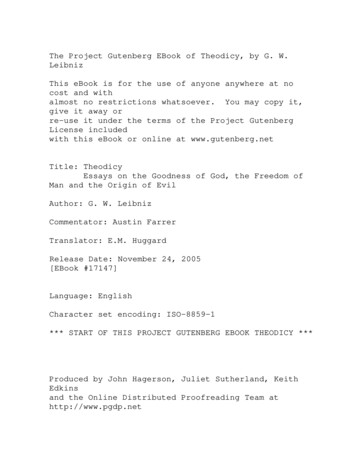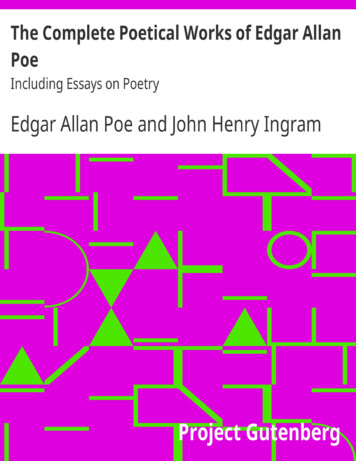
Transcription
The Project Gutenberg EBook of Edgar Allan Poe's Complete Poetical Worksby Edgar Allan PoeThis eBook is for the use of anyone anywhere at no cost and withalmost no restrictions whatsoever. You may copy it, give it away orre-use it under the terms of the Project Gutenberg License includedwith this eBook or online at www.gutenberg.netTitle: Edgar Allan Poe's Complete Poetical WorksAuthor: Edgar Allan PoeRelease Date: November 10, 2003 [EBook #10031]Language: English*** START OF THIS PROJECT GUTENBERG EBOOK COMPLETE POETICAL WORKS ***Produced by Clytie Siddall, Charles Aldarondo, Keren Vergonand the Online Distributed Proofreading Team.
Edgar Allan Poe'sComplete Poetical Worksedited byJohn H. IngramTable of ContentsPrefaceMemoirPoems of Later LifeDedicationPrefaceThe RavenThe BellsUlalumeTo HelenAnnabel LeeA ValentineAn Enigma
To My MotherFor AnnieTo F——To Frances S. OsgoodEldoradoEulalieA Dream Within a DreamTo Marie Louise (Shew)To The SameThe City in the SeaThe SleeperBridal BalladNotesPoems of ManhoodLenoreTo One in ParadiseThe ColiseumThe Haunted PalaceThe Conqueror WormSilenceDreamlandTo ZanteHymnNotesScenes from PolitianNotePoems of YouthIntroduction (1831)To ScienceAl AaraafTamerlaneTo HelenThe Valley of UnrestIsrafelTo —— ("I heed not that my earthly lot")To —— ("The Bowers whereat, in dreams, I see")To the RiverSongSpirits of the DeadA DreamRomanceFairyland
The LakeEvening StarImitation"The Happiest Day"Hymn (Translation from the Greek)Dreams"In Youth I have known one"A PæanNotesDoubtful PoemsAloneTo IsadoreThe Village StreetThe Forest ReverieNotesProse PoemsThe Island of the FayThe Power of WordsThe Colloquy of Monos and UnaThe Conversation of Eiros and CharmionShadow—a ParableSilence—a FableEssaysThe Poetic PrincipleThe Philosophy of CompositionOld English Poetry
PrefaceIn placing before the public this collection of Edgar Poe's poetical works, it is requisite to point outin what respects it differs from, and is superior to, the numerous collections which have preceded it.Until recently, all editions, whether American or English, of Poe's poems have been verbatim reprintsof the first posthumous collection, published at New York in 1850.In 1874 I began drawing attention to the fact that unknown and unreprinted poetry by Edgar Poe wasin existence. Most, if not all, of the specimens issued in my articles have since been reprinted bydifferent editors and publishers, but the present is the first occasion on which all the pieces referredto have been garnered into one sheaf. Besides the poems thus alluded to, this volume will be found tocontain many additional pieces and extra stanzas, nowhere else published or included in Poe's works.Such verses have been gathered from printed or manuscript sources during a research extending overmany years.In addition to the new poetical matter included in this volume, attention should, also, be solicited onbehalf of the notes, which will be found to contain much matter, interesting both from biographicaland bibliographical points of view.John H. Ingram.Contents
Memoir of Edgar Allan PoeDuring the last few years every incident in the life of Edgar Poe has been subjected to microscopicinvestigation. The result has not been altogether satisfactory. On the one hand, envy and prejudicehave magnified every blemish of his character into crime, whilst on the other, blind admiration woulddepict him as far "too good for human nature's daily food." Let us endeavor to judge him impartially,granting that he was as a mortal subject to the ordinary weaknesses of mortality, but that he wastempted sorely, treated badly, and suffered deeply.The poet's ancestry and parentage are chiefly interesting as explaining some of the complexities of hischaracter. His father, David Poe, was of Anglo-Irish extraction. Educated for the Bar, he elected toabandon it for the stage. In one of his tours through the chief towns of the United States he met andmarried a young actress, Elizabeth Arnold, member of an English family distinguished for its musicaltalents. As an actress, Elizabeth Poe acquired some reputation, but became even better known for herdomestic virtues. In those days the United States afforded little scope for dramatic energy, so it is notsurprising to find that when her husband died, after a few years of married life, the young widow hada vain struggle to maintain herself and three little ones, William Henry, Edgar, and Rosalie. Beforeher premature death, in December, 1811, the poet's mother had been reduced to the dire necessity ofliving on the charity of her neighbors.Edgar, the second child of David and Elizabeth Poe, was born at Boston, in the United States, on the19th of January, 1809. Upon his mother's death at Richmond, Virginia, Edgar was adopted by awealthy Scotch merchant, John Allan. Mr. Allan, who had married an American lady and settled inVirginia, was childless. He therefore took naturally to the brilliant and beautiful little boy, treated himas his son, and made him take his own surname. Edgar Allan, as he was now styled, after someelementary tuition in Richmond, was taken to England by his adopted parents, and, in 1816, placed atthe Manor House School, Stoke-Newington.Under the Rev. Dr. Bransby, the future poet spent a lustrum of his life neither unprofitably nor,apparently, ungenially. Dr. Bransby, who is himself so quaintly portrayed in Poe's tale of WilliamWilson, described "Edgar Allan," by which name only he knew the lad, as "a quick and clever boy,"who "would have been a very good boy had he not been spoilt by his parents," meaning, of course, theAllans. They "allowed him an extravagant amount of pocket-money, which enabled him to get into allmanner of mischief. Still I liked the boy," added the tutor, "but, poor fellow, his parents spoiled him."Poe has described some aspects of his school days in his oft cited story of William Wilson. Probablythere is the usual amount of poetic exaggeration in these reminiscences, but they are almost the onlyrecord we have of that portion of his career and, therefore, apart from their literary merits, are on thataccount deeply interesting. The description of the sleepy old London suburb, as it was in those days,is remarkably accurate, but the revisions which the story of William Wilson went through before itreached its present perfect state caused many of the author's details to deviate widely from theiroriginal correctness. His schoolhouse in the earliest draft was truthfully described as an "old,
irregular, and cottage-built" dwelling, and so it remained until its destruction a few years ago.The soi-disant William Wilson, referring to those bygone happy days spent in the English academy,says,"The teeming brain of childhood requires no external world of incident to occupy or amuse it.The morning's awakening, the nightly summons to bed; the connings, the recitations, theperiodical half-holidays and perambulations, the playground, with its broils, its pastimes, itsintrigues—these, by a mental sorcery long forgotten, were made to involve a wilderness ofsensation, a world of rich incident, a universe of varied emotion, of excitement the mostpassionate and spirit-stirring, 'Oh, le bon temps, que ce siècle de fer!'"From this world of boyish imagination Poe was called to his adopted parents' home in the UnitedStates. He returned to America in 1821, and was speedily placed in an academy in Richmond,Virginia, in which city the Allans continued to reside. Already well grounded in the elementaryprocesses of education, not without reputation on account of his European residence, handsome,proud, and regarded as the heir of a wealthy man, Poe must have been looked up to with no littlerespect by his fellow pupils. He speedily made himself a prominent position in the school, not onlyby his classical attainments, but by his athletic feats—accomplishments calculated to render him aleader among lads."In the simple school athletics of those days, when a gymnasium had not been heard of, he wasfacile princeps,"is the reminiscence of his fellow pupil, Colonel T. L. Preston. Poe he remembers as"a swift runner, a wonderful leaper, and, what was more rare, a boxer, with some slighttraining. He would allow the strongest boy in the school to strike him with full force in thechest. He taught me the secret, and I imitated him, after my measure. It was to inflate the lungs tothe uttermost, and at the moment of receiving the blow to exhale the air. It looked surprising, andwas, indeed, a little rough; but with a good breast-bone, and some resolution, it was not difficultto stand it. For swimming he was noted, being in many of his athletic proclivities surprisinglylike Byron in his youth."In one of his feats Poe only came off second best."A challenge to a foot race," says Colonel Preston, "had been passed between the two classicalschools of the city; we selected Poe as our champion. The race came off one bright May morningat sunrise, in the Capitol Square. Historical truth compels me to add that on this occasion ourschool was beaten, and we had to pay up our small bets. Poe ran well, but his competitor was along-legged, Indian-looking fellow, who would have outstripped Atalanta without the help of thegolden apples.""In our Latin exercises in school," continues the colonel, "Poe was among the first—not firstwithout dispute. We had competitors who fairly disputed the palm, especially one, Nat Howard,afterwards known as one of the ripest scholars in Virginia, and distinguished also as a profound
lawyer. If Howard was less brilliant than Poe, he was far more studious; for even then the germsof waywardness were developing in the nascent poet, and even then no inconsiderable portion ofhis time was given to versifying. But if I put Howard as a Latinist on a level with Poe, I do himfull justice." "Poe," says the colonel, "was very fond of the Odes of Horace, and repeated themso often in my hearing that I learned by sound the words of many before I understood theirmeaning. In the lilting rhythm of the Sapphics and Iambics, his ear, as yet untutored in morecomplicated harmonies, took special delight. Two odes, in particular, have been humming in myear all my life since, set to the tune of his recitation:'Jam satis terris nivis atque dirceGrandinis misit Pater, et rubente,'and'Non ebur neque aureumMea renidet in dono lacu ar,' etc."I remember that Poe was also a very fine French scholar. Yet, with all his superiorities, he wasnot the master spirit nor even the favorite of the school. I assign, from my recollection, this placeto Howard. Poe, as I recall my impressions now, was self-willed, capricious, inclined to beimperious, and, though of generous impulses, not steadily kind, nor even amiable; and so what hewould exact was refused to him. I add another thing which had its influence, I am sure. At thetime of which I speak, Richmond was one of the most aristocratic cities on this side of theAtlantic. A school is, of its nature, democratic; but still boys will unconsciously bear about theodor of their fathers' notions, good or bad. Of Edgar Poe," who had then resumed his parentalcognomen, "it was known that his parents had been players, and that he was dependent upon thebounty that is bestowed upon an adopted son. All this had the effect of making the boys declinehis leadership; and, on looking back on it since, I fancy it gave him a fierceness he wouldotherwise not have had."This last paragraph of Colonel Preston's recollections cast a suggestive light upon the causes whichrendered unhappy the lad's early life and tended to blight his prospective hopes. Although mixing withmembers of the best families of the province, and naturally endowed with hereditary and native pride,—fostered by the indulgence of wealth and the consciousness of intellectual superiority,—Edgar Poewas made to feel that his parentage was obscure, and that he himself was dependent upon the charityand caprice of an alien by blood. For many lads these things would have had but little meaning, but toone of Poe's proud temperament it must have been a source of constant torment, and all allusions to itgall and wormwood. And Mr. Allan was not the man to wean Poe from such festering fancies: as arule he was proud of the handsome and talented boy, and indulged him in all that wealth couldpurchase, but at other times he treated him with contumely, and made him feel the bitterness of hisposition.Still Poe did maintain his leading position among the scholars at that Virginian academy, and severalstill living have favored us with reminiscences of him. His feats in swimming to which ColonelPreston has alluded, are quite a feature of his youthful career. Colonel Mayo records one daringperformance in natation which is thoroughly characteristic of the lad. One day in mid-winter, when
standing on the banks of the James River, Poe dared his comrade into jumping in, in order to swim toa certain point with him. After floundering about in the nearly frozen stream for some time, theyreached the piles upon which Mayo's Bridge was then supported, and there attempted to rest and tryto gain the shore by climbing up the log abutment to the bridge. Upon reaching the bridge, however,they were dismayed to find that its plank flooring overlapped the abutment by several feet, and that itwas impossible to ascend it. Nothing remained for them but to let go their slippery hold and swimback to the shore. Poe reached the bank in an exhausted and benumbed condition, whilst Mayo wasrescued by a boat just as he was succumbing. On getting ashore Poe was seized with a violent attackof vomiting, and both lads were ill for several weeks.Alluding to another quite famous swimming feat of his own, the poet remarked,"Any 'swimmer in the falls' in my days would have swum the Hellespont, and thought nothing ofthe matter. I swam from Ludlam's Wharf to Warwick (six miles), in a hot June sun, against one ofthe strongest tides ever known in the river. It would have been a feat comparatively easy toswim twenty miles in still water. I would not think much," Poe added in a strain of exaggerationnot unusual with him, "of attempting to swim the British Channel from Dover to Calais."Colonel Mayo, who had tried to accompany him in this performance, had to stop on the way, and saysthat Poe, when he reached the goal, emerged from the water with neck, face, and back blistered. Thefacts of this feat, which was undertaken for a wager, having been questioned, Poe, ever intolerant ofcontradiction, obtained and published the affidavits of several gentlemen who had witnessed it. Theyalso certified that Poe did not seem at all fatigued, and that he walked back to Richmond immediatelyafter the performance.The poet is generally remembered at this part of his career to have been slight in figure and person,but to have been well made, active, sinewy, and graceful. Despite the fact that he was thus notedamong his schoolfellows and indulged at home, he does not appear to have been in sympathy with hissurroundings. Already dowered with the "hate of hate, the scorn of scorn," he appears to have madefoes both among those who envied him and those whom, in the pride of intellectuality, he treated withpugnacious contempt. Beneath the haughty exterior, however, was a warm and passionate heart,which only needed circumstance to call forth an almost fanatical intensity of affection. A wellauthenticated instance of this is thus related by Mrs. Whitman:"While at the academy in Richmond, he one day accompanied a schoolmate to his home, wherehe saw, for the first time, Mrs. Helen Stannard, the mother of his young friend. This lady, onentering the room, took his hands and spoke some gentle and gracious words of welcome, whichso penetrated the sensitive heart of the orphan boy as to deprive him of the power of speech, andfor a time almost of consciousness itself. He returned home in a dream, with but one thought, onehope in life —to hear again the sweet and gracious words that had made the desolate world sobeautiful to him, and filled his lonely heart with the oppression of a new joy. This ladyafterwards became the confidant of all his boyish sorrows, and hers was the one redeeminginfluence that saved and guided him in the earlier days of his turbulent and passionate youth."When Edgar was unhappy at home, which, says his aunt, Mrs. Clemm, "was very often the case, he
went to Mrs. Stannard for sympathy, for consolation, and for advice." Unfortunately, the sad fortunewhich so frequently thwarted his hopes ended this friendship. The lady was overwhelmed by aterrible calamity, and at the period when her guiding voice was most requisite, she fell a prey tomental alienation. She died, and was entombed in a neighboring cemetery, but her poor boyishadmirer could not endure to think of her lying lonely and forsaken in her vaulted home, so he wouldleave the house at night and visit her tomb. When the nights were drear, "when the autumnal rains fell,and the winds wailed mournfully over the graves, he lingered longest, and came away mostregretfully."The memory of this lady, of this "one idolatrous and purely ideal love" of his boyhood, was cherishedto the last. The name of Helen frequently recurs in his youthful verses, "The Pæan," now first includedin his poetical works, refers to her; and to her he inscribed the classic and exquisitely beautifulstanzas beginning "Helen, thy beauty is to me."Another important item to be noted in this epoch of his life is that he was already a poet. Among hisschoolfellows he appears to have acquired some little reputation as a writer of satirical verses; but ofhis poetry, of that which, as he declared, had been with him "not a purpose, but a passion," heprobably preserved the secret, especially as we know that at his adoptive home poesy was aforbidden thing. As early as 1821 he appears to have essayed various pieces, and some of these wereultimately included in his first volume. With Poe poetry was a personal matter—a channel throughwhich the turbulent passions of his heart found an outlet. With feelings such as were his, it came topass, as a matter of course, that the youthful poet fell in love. His first affair of the heart is, doubtless,reminiscently portrayed in what he says of his boyish ideal, Byron. This passion, he remarks, "ifpassion it can properly be called, was of the most thoroughly romantic, shadowy, and imaginativecharacter. It was born of the hour, and of the youthful necessity to love. It had no peculiar regard tothe person, or to the character, or to the reciprocating affection. Any maiden, not immediately andpositively repulsive," he deems would have suited the occasion of frequent and unrestrictedintercourse with such an imaginative and poetic youth. "The result," he deems, "was not merelynatural, or merely probable; it was as inevitable as destiny itself."Between the lines may be read the history of his own love. "The Egeria of his dreams—the VenusAphrodite that sprang in full and supernal loveliness from the bright foam upon the storm-tormentedocean of his thoughts," was a little girl, Elmira Royster, who lived with her father in a house oppositeto the Allans in Richmond. The young people met again and again, and the lady, who has only recentlypassed away, recalled Edgar as "a beautiful boy," passionately fond of music, enthusiastic andimpulsive, but with prejudices already strongly developed. A certain amount of love-making tookplace between the young people, and Poe, with his usual passionate energy, ere he left home for theUniversity had persuaded his fair inamorata to engage herself to him. Poe left home for the Universityof Virginia, Charlottesville, in the beginning of 1825. lie wrote frequently to Miss Royster, but herfather did not approve of the affair, and, so the story runs, intercepted the correspondence, until itceased. At seventeen, Elmira became the bride of a Mr. Shelton, and it was not until some timeafterwards that Poe discovered how it was his passionate appeals had failed to elicit any responsefrom the object of his youthful affection.Poe's short uni
by Edgar Allan Poe This eBook is for the use of anyone anywhere at no cost and with almost no restrictions whatsoever. You may copy it, give it away or re-use it under the terms of the Project Gutenberg License included with this eBook or online at www.gutenberg.net Title: Edgar Allan Poe's Complete Poetical Works Author: Edgar Allan Poe .


